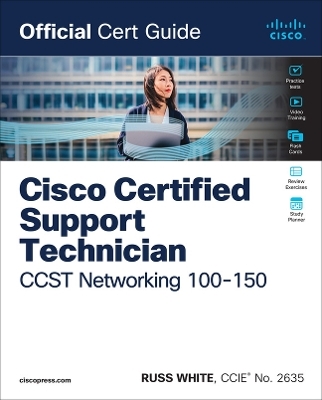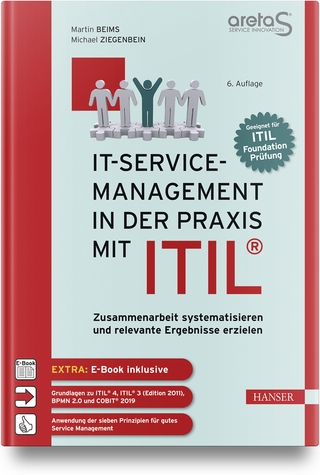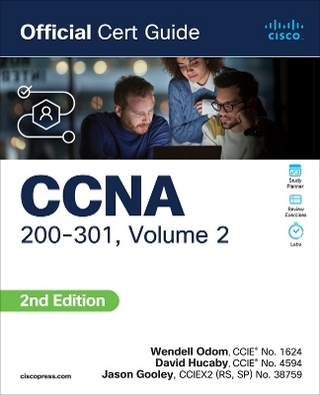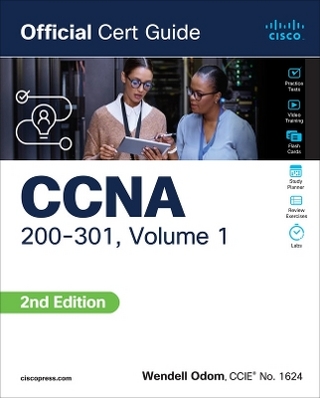
Cisco Certified Support Technician CCST Networking 100-150 Official Cert Guide
Cisco Press (Verlag)
978-0-13-821342-8 (ISBN)
This complete study package includes
A test-preparation routine proven to help you pass the exam
Do I Know This Already? quizzes, which allow you to decide how much time you need to spend on each section
Exam Topic lists that make referencing easy
Chapter-ending exercises, which help you drill on key concepts you must know thoroughly
The powerful Pearson Test Prep Practice Test software, complete with hundreds of well-reviewed, exam-realistic questions, customization options, and detailed performance reports
More than 5 hours of video mentoring from the author
An online Flash Cards application to help you drill on Key Terms by chapter
A final preparation chapter, which guides you through tools and resources to help you craft your review and test-taking strategies
Study plan suggestions and templates to help you organize and optimize your study time
Content Update Program:
This Cert Guide includes coverage of all the topics on the Cisco Certified Support Technician CCST Networking exam from the original exam blueprint. Visit ciscopress.com/newcerts for information on any digital updates for this book that align with Cisco exam blueprint version changes
The Cisco Certified Support Technician CCST Networking 100-150 Official Cert Guide walks you through all the exam topics found in the Cisco CCST exam. Topics covered include
Standards and Concepts
Addressing and Subnet Formats
Endpoints and Media Types
Infrastructure
Diagnosing Problems
Security
Companion Website
The companion website contains more than 200 unique practice exam questions, practice exercises, a study planner, online flash cards, and more than 5 hours of video training.
Pearson Test Prep online system requirements:
Browsers: Chrome version 73 and above, Safari version 12 and above, Microsoft Edge 44 and above.
Devices: Desktop and laptop computers, tablets running on Android v8.0 and above and iOS v13 and above, smartphones with a minimum screen size of 4.7”. Internet access required.
Pearson Test Prep offline system requirements:
Windows 11, Windows 10, Windows 8.1; Microsoft .NET Framework 4.5 Client; Pentium-class 1 GHz processor (or equivalent); 512 MB RAM; 650 MB disk space plus 50 MB for each downloaded practice exam; access to the Internet to register and download exam databases
Also available from Cisco Press for CCST study is the Cisco Certified Support Technician CCST Networking 100-150 Official Cert Guide Premium Edition and Practice Test. This digital-only certification preparation product combines an eBook with an enhanced Pearson Test Prep Practice Test.
This integrated learning package:
Enables you to focus on individual topic areas or take complete, timed exams
Includes direct links from each question to detailed tutorials to help you understand the concepts behind the questions
Provides unique sets of exam-realistic practice questions
Tracks your performance and provides feedback on a module-by-module basis, laying out a complete assessment of your knowledge to help you focus your study where it is needed most
Russ White has more than 20 years of experience in designing, deploying, breaking, and troubleshooting large-scale networks. Across that time, he has coauthored 48 software patents, has spoken at venues throughout the world, has participated in the development of several Internet standards, has helped develop the CCDE and the CCAr, and has worked in Internet governance with the ISOC. Russ is currently a senior architect at Akamai Technologies, where he works on next-generation data center designs, complexity, security, and privacy. His most recent books are The Art of Network Architecture, Navigating Network Complexity, and Problems and Solutions in Network Engineering. MSIT Capella University, MACM Shepherds Theological Seminary, PhD Southeastern Baptist Theological Seminary, CCIE No. 2635, CCDE 2007:001, CCAr
Introduction xxvi
Part I Foundations 3
Chapter 1 Shipping Things 6
“Do I Know This Already?” Quiz 6
Foundation Topics 8
The Purpose of Packaging 8
The Physical World 8
Computer Networks 9
Addressing 11
The Physical World 11
Computer Networks 12
Hosts and Devices 14
Packaging Data 15
What Is a Protocol? 16
What Is Metadata? 17
Tunnels 17
Review All the Key Topics 19
Key Terms You Should Know 20
Concepts and Actions 20
Chapter 2 Addresses 22
“Do I Know This Already?” Quiz 22
Foundation Topics 24
Address Scope 24
Receiver Set 24
Topological Reach 25
Physical Addresses 28
Internet Protocol Version 4 30
Why Two Addresses? 32
What an IP Address Represents 34
Calculating Prefixes and Subnets Using Subnet Masks 34
Calculating Prefixes and Subnets Using a Skip Chart 35
Calculating Prefixes Using Skips 36
Internet Protocol Version 6 37
Aggregation 39
Network Prefixes 41
Private Address Space 41
Publicly Routable Address Space 42
Reserved Addresses 43
Ports and Sockets 44
Network Address Translation 45
Review All the Key Topics 47
Key Terms You Should Know 48
Concepts and Actions 48
Chapter 3 Routing and Switching 52
“Do I Know This Already?” Quiz 52
Foundation Topics 54
Assigning IP Addresses to Hosts 54
Manual Configuration 54
Calculate an IP Address 54
Computing a Link Local Address 55
Computing a Global Address 56
Physical Addresses and Privacy 56
Assign an Address Through a Protocol 57
IPv4 DHCP 57
IPv6 DHCP and Router Advertisements 58
Host-to-Host Communication and Address Resolution on a Single Wire 59
IPv4 Address Resolution 60
IPv6 Address Resolution 60
Switching Packets 61
Multiple Hops and Switching 63
Routing Packets 66
Using the Routing Table to Forward Packets 68
Building the Routing Table 70
Metrics 73
What Happens Inside a Router? 74
Routers versus Switches 75
Routing Loops 76
Asymmetric Paths 76
Redirects and Relays 77
Review All the Key Topics 79
Key Terms You Should Know 79
Concepts and Actions 79
Chapter 4 Wired Host Networking Configuration 82
“Do I Know This Already?” Quiz 83
Foundation Topics 85
Windows 85
The Settings App 85
The Control Panel 86
The Command Line 88
macOS 91
System Preferences 91
The Terminal Command Line 93
System Information 94
Linux 95
Verifying Connectivity 97
Ping 97
Traceroute 99
Finding Your Public IP Address 101
Review All the Key Topics 103
Key Terms You Should Know 103
Concepts and Actions 103
Chapter 5 What's in a Network? 106
“Do I Know This Already?” Quiz 106
Foundation Topics 108
Hosts and Virtual Hosts 108
Mobile Devices 111
Things 113
Middleboxes 115
The Firewall 115
The Intrusion Detection System 116
The Proxy or Gateway 116
The Load Balancer 117
The Global Internet 118
Internet Assigned Numbers Authority 119
Internet Corporation for Assigned Names and Numbers 119
Regional Internet Registries 119
Top-Level Domain Owners 120
Transit Providers 120
Access Providers 120
Content Providers 120
Content Distribution Networks 121
Internet Exchange Providers 121
Review All the Key Topics 122
Key Terms You Should Know 123
Concepts and Actions 123
Chapter 6 Network Models 126
“Do I Know This Already?” Quiz 126
Foundation Topics 128
Why Are Models Important? 128
The OSI Seven-Layer Model 129
The TCP/IP Model 133
The Recursive Internet Architecture 134
Review All the Key Topics 136
Key Terms You Should Know 137
Concepts and Actions 137
Part II Infrastructure 139
Chapter 7 Wired Networks 140
“Do I Know This Already?” Quiz 141
Foundation Topics 142
Electrical Transmission and Interference 142
Measuring Interference 145
Other Cable Ratings 146
The Maximum Transmission Unit 146
Ethernet over Copper 147
Ethernet Bus Topologies 147
Ethernet Star Topologies 148
Ethernet Twisted Pair 150
Power Over Ethernet 152
Fiber 152
Fiber Cables 154
Fiber Networking Hardware 155
Fiber Connectors 156
Looking into a Fiber 157
Pluggable Interfaces 158
Review All the Key Topics 160
Key Terms You Should Know 161
Concepts and Actions 161
Chapter 8 Wireless Networks 162
“Do I Know This Already?” Quiz 162
Foundation Topics 164
Free Space Concepts 164
Wave Propagation and Beam Forming 164
Wireless Interference 167
Bandwidth and Signal Strength 168
The Electromagnetic Spectrum 169
Wi-Fi 170
Wi-Fi Components 171
Wi-Fi Mesh Systems 172
Advantages and Disadvantages of Wi-Fi 173
Sharing the Bandwidth 174
Channel Selection 174
Cellular 174
Radio Access Network (RAN) 175
Mobile Core 176
Advantages and Disadvantages of Cellular Networks 177
Satellite 177
Review All the Key Topics 179
Key Terms You Should Know 180
Concepts and Actions 180
Chapter 9 Bandwidth, Delay, and Jitter 182
“Do I Know This Already?” Quiz 182
Foundation Topics 184
Bandwidth and Throughput 184
Throughput versus Bandwidth 184
Bandwidth versus Goodput 185
The Bandwidth of a Link versus Bandwidth of a Path 186
Bandwidth and Delay 186
Clocking Packets onto the Wire 187
Queueing 188
Jitter 189
Measuring Network Performance 190
Speed Test Websites 190
iPerf 191
Mike's Traceroute (MTR) 193
Review All the Key Topics 194
Key Terms You Should Know 195
Concepts and Actions 195
Chapter 10 Basic Network Hardware 196
“Do I Know This Already?” Quiz 196
Foundation Topics 198
Hardware, Ports, and Lights 198
Network Diagrams 204
Network Wiring 207
Handling the Heat 209
Review All the Key Topics 211
Key Terms You Should Know 211
Concepts and Actions 212
Chapter 11 Local Area Networks 214
“Do I Know This Already?” Quiz 215
Foundation Topics 217
Building and Campus Networks 217
Equipment Closet (Building Distribution Frame) 218
Wiring Closet (Intermediate Distribution Frame) 218
Server Room 218
Riser 218
Wi-Fi Access Points 218
Zoned Access 218
The Home Network 219
Network Core 219
MODEM 220
Physical Connections to the Home 221
Cable Cutting 222
Combining the MODEM with Other Devices 223
Demarcation 223
The SSID and Wi-Fi Guest Network 224
Which Devices Should Be Wired? 225
Wi-Fi Limitations 225
Traffic Flows 226
Choosing Devices to Wire 226
Configuring the Home Network 227
Configuring the MODEM 227
Configuring the Router and Firewall 227
Main Configuration Screen 227
The More Settings Screen 229
Advanced Options 231
NAT Forwarding 232
Configuring the Wireless Access Point 234
SSID and Password 234
Security 235
Configuring a Windows Host for Wi-Fi Connectivity 236
Configuring Apple's macOS for Wi-Fi Connectivity 238
Configuring Mobile Devices for Wi-Fi Connectivity 240
Review All the Key Topics 241
Key Terms You Should Know 242
Concepts and Actions 242
Chapter 12 Wide Area Networks 244
“Do I Know This Already?” Quiz 244
Foundation Topics 246
Common Challenges to Building Wide Area Networks 246
Right-of-Way 246
Physical Plant 247
Metro and Last-Mile Network Design 249
Transit Provider Design 250
Ring and Hub-and-Spoke Topologies 251
Review All the Key Topics 253
Key Terms You Should Know 254
Concepts and Actions 254
Part III Services 257
Chapter 13 Data Centers and Fabrics 258
“Do I Know This Already?” Quiz 258
Foundation Topics 260
Web Applications 260
Internet Exchange Points 262
Spine-and-Leaf Fabrics 263
Clos Fabrics 264
Butterfly Fabrics 267
Review All the Key Topics 269
Key Terms You Should Know 269
Concepts and Actions 270
Chapter 14 Network Transport 272
“Do I Know This Already?” Quiz 273
Foundation Topics 275
Internet Protocol Version 4 275
Fragmentation 276
Time to Live 277
Internet Protocol Version 6 278
IPv6 Goals 279
Autoconfiguration 279
Eliminating NAT 280
IPv6 Packet Format 281
User Datagram Protocol 282
Connectionless versus Connection-Oriented Transport Protocols 282
The UDP Header 283
Checksums 283
Transmission Control Protocol 283
Building a TCP Connection 283
TCP Flow and Error Control 285
Quick UDP Internet Connections (QUIC) 288
Identifying Flows 289
Path MTU Discovery 289
Review All the Key Topics 291
Key Terms You Should Know 292
Concepts and Actions 292
Chapter 15 Application Transport 294
“Do I Know This Already?” Quiz 294
Foundation Topics 296
Marshaling Systems 296
Fixed-Length Fields 296
Type-Length Values 298
Secure Shell 300
Hypertext Transfer Protocol 303
File Transfer Protocol 305
Review All the Key Topics 307
Key Terms You Should Know 308
Concepts and Actions 308
Chapter 16 Names and Time 310
“Do I Know This Already?” Quiz 310
Foundation Topics 312
The Domain Name Space 312
Domain Names Can Represent an Organization 313
Domain Names Can Represent a Service 313
Domain Names Can Represent a Piece of Information 314
Domain Names and Addresses from a Computer Networking Perspective 314
The Life of a DNS Query 314
Negative DNS Responses 318
Common DNS Records 319
DNS Architecture and Operations 319
Recursive Servers 319
Root Servers 320
TLD Servers 322
Authoritative Servers 322
DNS Security and Privacy 323
Encrypted DNS Queries 323
Oblivious Encrypted DNS Queries 324
Encrypted DNS Records 325
Diagnosing DNS 326
Name Server Lookup 326
Domain Information Groper 329
Web-Based DNS Tools 330
The Network Time Protocol 332
Review All the Key Topics 334
Key Terms You Should Know 335
Concepts and Actions 335
Chapter 17 Cloud Computing 336
“Do I Know This Already?” Quiz 336
Foundation Topics 338
Cloud Computing 338
Who Owns the Resources 338
Cloud Computing Service Models 339
Typical Public Cloud Service Mix 340
Cloud Resilience 341
Connecting to the Cloud 342
Public versus Private Cloud 343
Insurance Estimation Application 344
Manufacturing IOT Deployment 346
Customer Analytics 348
Choosing Public or Private Cloud 348
The Impact of Cloud Computing on Network Engineering 349
Pets versus Cattle 349
Automation 349
Cloud-Based Network Management 350
Remote and Hybrid Work 350
Employment Shifts 350
Information Technology Cycles 350
Review All the Key Topics 351
Key Terms You Should Know 352
Concepts and Actions 352
Part IV Security 355
Chapter 18 Security and Privacy Concepts 358
“Do I Know This Already?” Quiz 358
Foundation Topics 360
A Security Taxonomy 360
Shift Left 362
Privacy Concepts 363
Personally Identifiable Information 363
Data Lifecycle 364
The Law and Privacy 365
Privacy Tools 366
Suppression 366
Noise Injection 367
Aggregation 368
Segmentation 368
Privacy and Network Operations 369
Forwarded Packets 369
Logged Information 369
Protecting Logged User Information 370
Authentication, Authorization, and Accounting 370
Identity Stores 372
Review All the Key Topics 373
Key Terms You Should Know 373
Concepts and Actions 374
Chapter 19 Attacks and Threats 376
“Do I Know This Already?” Quiz 377
Foundation Topics 378
Defining Attacks and Threats 378
Attack Surface 379
Vulnerability 379
Threat 380
Exploit 380
Risk 381
Gaining Access 381
Social Engineering 381
Malware 382
Supply Chain Attack 383
Poor Configuration 383
Man-in-the-Middle Attacks 383
Lateral Movement 384
Attack Actions 385
Command and Control 386
Data Exfiltration 386
Ransomware 386
Denial of Service 387
Direct (or Burner) Attack 387
Reflection Attack 388
Resource Exhaustion 389
Review All the Key Topics 391
Key Terms You Should Know 392
Concepts and Actions 392
Chapter 20 Security Tools 394
“Do I Know This Already?” Quiz 394
Foundation Topics 397
Authentication Tools 397
Single Sign-On 397
Zero Trust 399
Strong Passwords 400
Two-Factor Authentication (2FA) 403
Passwordless Systems 404
Defensive Tools and Design 405
Stateful and Contextual Packet Filtering 405
Source Address Validation 408
Defense in Depth 409
Countering Spam and Phishing 410
System-Level Defenses 410
How to Detect a Phish 412
Encryption 413
Exchanging Private Keys 415
Cryptographic Signatures 416
Virtual Private Networks 418
Review All the Key Topics 421
Key Terms You Should Know 422
Concepts and Actions 422
Part V Managing Networks 425
Chapter 21 Managing Networks 426
“Do I Know This Already?” Quiz 427
Foundation Topics 428
Network Documentation 428
Descriptions 429
Baselines 430
Failure Reports 430
Hardware and Software 431
Network Processes and Lifecycle 431
Managing Change 433
Testing Techniques 433
Technical Debt 436
Management Challenges 436
The Observability Problem 436
Failure Rates in the Real World 437
Connecting to Manage 438
In-Band and Out-of-Band Management 438
Connecting Through a Terminal Emulator 439
Device Management Security Practices 439
Management Systems 440
NMS Dashboard 442
Work Process System 442
Modeling Language versus Configuration 442
Cloud-Managed Networks 443
Review All the Key Topics 445
Key Terms You Should Know 446
Concepts and Actions 446
Chapter 22 Troubleshooting 448
“Do I Know This Already?” Quiz 449
Foundation Topics 450
Failure Terminology 450
What Is a Failure? 450
Failure Frequency 451
Fragility and Resilience 452
Troubleshooting Tools and Techniques 454
The Half-Split Method 454
Fixes 456
The Post-Mortem 457
Applying the Process: An Example 457
Packet Captures 460
Advice to Troubleshooters 464
Review All the Key Topics 465
Key Terms You Should Know 465
Concepts and Actions 465
Chapter 23 Configuring a Network 468
“Do I Know This Already?” Quiz 468
Foundation Topics 471
Initial Access 471
Configuring IPv4 475
Configuring Routing 479
Configuring Remote Access and Security 485
Adding IPv6 487
Adding a Switch 490
Review All the Key Topics 494
Key Terms You Should Know 494
Concepts and Actions 495
Part VI Final Preparation 499
Chapter 24 Final Preparation 500
Advice to Future Engineers 500
Learning Consolidation Activities 501
Suggested Plan for Final Review and Study 503
Part VII Exam Updates 505
Chapter 25 Cisco Certified Support Technician CCST Networking 100-150 Official Cert Guide Exam Updates 506
The Purpose of This Chapter 506
About Possible Exam Updates 507
Impact on You and Your Study Plan 507
News About the Next Exam Release 508
Updated Technical Content 508
Part VIII Appendices 509
Appendix A Answers to the “Do I Know This Already?” Questions 510
Glossary of Key Terms 519
Online Elements
Appendix B Concepts and Actions Memory Tables
Appendix C Solutions to Concepts and Actions Memory Tables
Appendix D Study Planner
Glossary of Key Terms
9780138213428 TOC---10/5/2023
| Erscheinungsdatum | 12.12.2023 |
|---|---|
| Reihe/Serie | Official Cert Guide |
| Verlagsort | Indianapolis |
| Sprache | englisch |
| Maße | 188 x 233 mm |
| Gewicht | 1000 g |
| Themenwelt | Mathematik / Informatik ► Informatik ► Netzwerke |
| Informatik ► Weitere Themen ► Zertifizierung | |
| ISBN-10 | 0-13-821342-9 / 0138213429 |
| ISBN-13 | 978-0-13-821342-8 / 9780138213428 |
| Zustand | Neuware |
| Haben Sie eine Frage zum Produkt? |
aus dem Bereich


